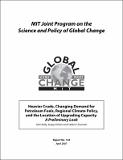Heavier Crude, Changing Demand for Petroleum Fuels, Regional Climate Policy, and the Location of Upgrading Capacity:
Author(s)
Reilly, John; Paltsev, Sergey; Choumert, Frederic
DownloadMITJPSPGC_Rpt144.pdf (645.7Kb)
Metadata
Show full item recordAbstract
The crude slate is likely to become heavier in the future with greater reliance on bitumens, tar sands, heavy oils, and eventually possibly shale oil. Under standard refining processes these crude oil sources produce a larger fraction of heavy products. At the same time, petroleum product demand growth is likely to disproportionately favor mid-weight products because of the strongly growing demand for transportation fuels including diesel, jet fuel, and gasoline. This will create a significant demand for new upgrading capacity in the refinery sector, and these upgrading facilities are themselves a significant source of carbon emissions. Using a version of the MIT Emissions Prediction and Policy Analysis (EPPA) model that separately considers five petroleum products we examine the need for, and the location of, refinery upgrading capacity under significant carbon policy in developed countries but not in developing countries. The results show that a carbon policy leads to a shift of most of the investment in upgrading capacity to developing countries, where the cost of carbon control is avoided, resulting in significant carbon leakage.
Description
Abstract in HTML and technical report in PDF available on the Massachusetts Institute of Technology Joint Program on the Science and Policy of Global Change website (http://mit.edu/globalchange/www/).
Date issued
2007-04Publisher
MIT Joint Program on the Science and Policy of Global Change
Citation
Report no. 144
Series/Report no.
Report no. 144